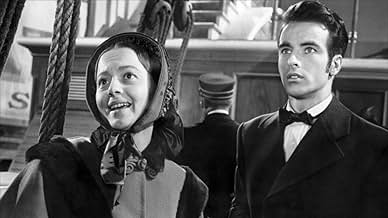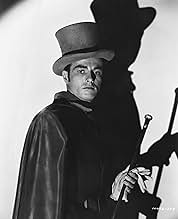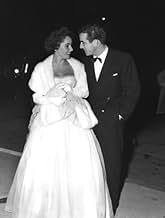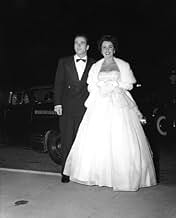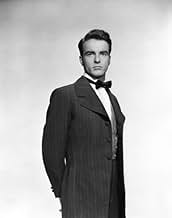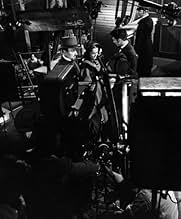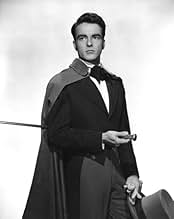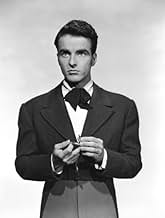AVALIAÇÃO DA IMDb
8,1/10
18 mil
SUA AVALIAÇÃO
Uma jovem ingênua se apaixona por um jovem bonito que seu pai, um abusador emocional, suspeita ser um caçador de fortunas.Uma jovem ingênua se apaixona por um jovem bonito que seu pai, um abusador emocional, suspeita ser um caçador de fortunas.Uma jovem ingênua se apaixona por um jovem bonito que seu pai, um abusador emocional, suspeita ser um caçador de fortunas.
- Direção
- Roteiristas
- Artistas
- Ganhou 4 Oscars
- 13 vitórias e 9 indicações no total
Mary Bayless
- Party Guest
- (não creditado)
Nan Boardman
- French Maid
- (não creditado)
Jack Chefe
- French Waiter
- (não creditado)
Marcel De la Brosse
- French Porter
- (não creditado)
Ray De Ravenne
- French Waiter
- (não creditado)
Avaliações em destaque
Rewatching The Heiress after remembering nothing but great things about it, the film was every bit as brilliant as remembered and even better in fact. It is one of William Wyler's best, in a list that includes Ben-Hur, Roman Holiday and Dodsworth, and while there are some fine film adaptations of Henry James' work, like The Innocents and The Wings of a Dove my vote for the best goes to this, The Heiress.
Visually, it looks absolutely beautiful and is rich in atmosphere. The Gothic set design is atmospheric and strikingly handsome (never getting in the way of the characters or the story), the costumes are elegantly evocative, the shadowy lighting adds so much to the atmosphere without making it obvious and The Heiress really does have to be one of the most exquisitely shot films of the late 40s, not only being very easy on the eyes but also very expansive which allows us to really be part of the action and be really engrossed in how all the characters interact with one another. Aaron Copland's haunting Oscar-winning score is some of his best work, and Wyler directs immaculately, his work worthy of winning the Oscar rather than just being nominated.
The Heiress is also superbly scripted, with sharp, sometimes cruel but always compellingly realistic, dialogue, the subject matter explored intelligently, poignantly and sometimes chillingly. The story is chillingly intense and also absorbingly intimate, always powerful and never less than interesting, while the characters actually feel like real people (Morris is the least interesting one of the bunch, but only because of how compellingly written Catherine and Dr Sloper are. Wyler is also well-known for drawing out great performances and ensemble work, and not only do we get both here across the board but they're more than great. Olivia de Havilland won her second Oscar for this film, and it was richly deserved, it is a very meaty role with a character transformation from shy to cruel that could have rung false but de Havilland plays the shyness with poignant nuance and the cruelness to spine-chilling effect, by far my favourite performance from her.
Montgomery Clift has had more interesting characters in his career, but he plays the role with control and subtlety, even also with an unsettling ambiguity as well. Ralph Richardson, like de Havilland, also delivers his finest screen work in this film, the character's coldness played to perfection. Dr Sloper and Catherine's father/daughter relationship is somewhat the core of the film and is played with brilliant passion by both Richardson and de Havilland. Miriam Hopkins is amusing and charming, but in a way that doesn't jar at all, despite how it sounds in comparison to the story.
In conclusion, a brilliant film, one of Wyler's best films and the finest screen adaptation of Henry James with career-best work from de Havilland and Richardson. 10/10 Bethany Cox
Visually, it looks absolutely beautiful and is rich in atmosphere. The Gothic set design is atmospheric and strikingly handsome (never getting in the way of the characters or the story), the costumes are elegantly evocative, the shadowy lighting adds so much to the atmosphere without making it obvious and The Heiress really does have to be one of the most exquisitely shot films of the late 40s, not only being very easy on the eyes but also very expansive which allows us to really be part of the action and be really engrossed in how all the characters interact with one another. Aaron Copland's haunting Oscar-winning score is some of his best work, and Wyler directs immaculately, his work worthy of winning the Oscar rather than just being nominated.
The Heiress is also superbly scripted, with sharp, sometimes cruel but always compellingly realistic, dialogue, the subject matter explored intelligently, poignantly and sometimes chillingly. The story is chillingly intense and also absorbingly intimate, always powerful and never less than interesting, while the characters actually feel like real people (Morris is the least interesting one of the bunch, but only because of how compellingly written Catherine and Dr Sloper are. Wyler is also well-known for drawing out great performances and ensemble work, and not only do we get both here across the board but they're more than great. Olivia de Havilland won her second Oscar for this film, and it was richly deserved, it is a very meaty role with a character transformation from shy to cruel that could have rung false but de Havilland plays the shyness with poignant nuance and the cruelness to spine-chilling effect, by far my favourite performance from her.
Montgomery Clift has had more interesting characters in his career, but he plays the role with control and subtlety, even also with an unsettling ambiguity as well. Ralph Richardson, like de Havilland, also delivers his finest screen work in this film, the character's coldness played to perfection. Dr Sloper and Catherine's father/daughter relationship is somewhat the core of the film and is played with brilliant passion by both Richardson and de Havilland. Miriam Hopkins is amusing and charming, but in a way that doesn't jar at all, despite how it sounds in comparison to the story.
In conclusion, a brilliant film, one of Wyler's best films and the finest screen adaptation of Henry James with career-best work from de Havilland and Richardson. 10/10 Bethany Cox
10dglink
Certainly among the finest literary adaptations, "The Heiress" was based on Henry James's novel, "Washington Square" and features arguably Olivia de Havilland's finest screen performance. Morris Townsend , a handsome young man with ambiguous motives pursues Catherine Sloper, a plain spinster, who is slightly past marriageable age and possesses limited social skills. The young woman, who is the heiress of the title, is vulnerable prey for a penniless fortune hunter.
However, Montgomery Clift plays Townsend in an enigmatic manner, and viewers can debate his true intentions. Catherine's father, played by Ralph Richardson, and her Aunt Lavinia, played by Miriam Hopkins, take opposite sides in Townsend's pursuit of Catherine. Although both her father and her aunt appear to see through the handsome suitor, Aunt Lavinia is practical and sensitive to her niece's emotional needs, and she counsels compromise in pursuit of happiness, if only fleeting. However, Catherine's father is unyielding and essentially unloving in his opposition to the match. Throughout, Dr. Sloper compares his daughter's virtues to those of his late wife, and Catherine comes up lacking in every quality that he values. Sloper threatens to disinherit his daughter if she marries the suitor.
Montgomery Clift may appear shallow and transparent to some, but in essence those are the traits of his character. While Morris is slick and obviously fawning, he is not intelligent enough to be totally deceptive. Only someone as naive and needy as Olivia could fail to grasp that Morris may want something more than her love. Olivia de Havilland transcends her other performances and skillfully and convincingly evolves from a shy, introverted girl into a strong, vengeful woman. De Havilland has often portrayed women who appear genteel and soft on the outside, but whose hearts and backbones can harden into pure steel (e.g. Gone with the Wind; Hush, Hush, Sweet Charlotte), and Catherine Sloper is the finest of those roles. With able support from Richardson and Hopkins, Clift and de Havilland make the most of an outstanding screenplay, which was adapted from a stage play. William Wyler directs with a sure hand, and the atmospheric cinematography captures 19th century New York life. Period films are often unraveled by their hairstyles, which generally owe more to the year in which the film was made rather than that in which the story is set. However, even the coiffures excel in "The Heiress." De Havilland's hair looks authentic 19th century and underscores Wyler's fastidious attention to detail.
With an award-winning de Havilland performance, a handsome Montgomery Clift on the brink of stardom, and an engrossing Henry James story, "The Heiress" is one of the finest films of the 1940's. Without qualification, the film holds up to and merits repeat viewings if only to better argue the underlying motives of Clift and the fateful decision that de Havilland has to make.
However, Montgomery Clift plays Townsend in an enigmatic manner, and viewers can debate his true intentions. Catherine's father, played by Ralph Richardson, and her Aunt Lavinia, played by Miriam Hopkins, take opposite sides in Townsend's pursuit of Catherine. Although both her father and her aunt appear to see through the handsome suitor, Aunt Lavinia is practical and sensitive to her niece's emotional needs, and she counsels compromise in pursuit of happiness, if only fleeting. However, Catherine's father is unyielding and essentially unloving in his opposition to the match. Throughout, Dr. Sloper compares his daughter's virtues to those of his late wife, and Catherine comes up lacking in every quality that he values. Sloper threatens to disinherit his daughter if she marries the suitor.
Montgomery Clift may appear shallow and transparent to some, but in essence those are the traits of his character. While Morris is slick and obviously fawning, he is not intelligent enough to be totally deceptive. Only someone as naive and needy as Olivia could fail to grasp that Morris may want something more than her love. Olivia de Havilland transcends her other performances and skillfully and convincingly evolves from a shy, introverted girl into a strong, vengeful woman. De Havilland has often portrayed women who appear genteel and soft on the outside, but whose hearts and backbones can harden into pure steel (e.g. Gone with the Wind; Hush, Hush, Sweet Charlotte), and Catherine Sloper is the finest of those roles. With able support from Richardson and Hopkins, Clift and de Havilland make the most of an outstanding screenplay, which was adapted from a stage play. William Wyler directs with a sure hand, and the atmospheric cinematography captures 19th century New York life. Period films are often unraveled by their hairstyles, which generally owe more to the year in which the film was made rather than that in which the story is set. However, even the coiffures excel in "The Heiress." De Havilland's hair looks authentic 19th century and underscores Wyler's fastidious attention to detail.
With an award-winning de Havilland performance, a handsome Montgomery Clift on the brink of stardom, and an engrossing Henry James story, "The Heiress" is one of the finest films of the 1940's. Without qualification, the film holds up to and merits repeat viewings if only to better argue the underlying motives of Clift and the fateful decision that de Havilland has to make.
10eadoe
One of my favorite movies, based on one of my favorite books. Henry James sitting in the audience would have been proud of this insightful filming of his novel, "Washington Square," because the film retains so much of the subtlety of his own writing. Usually, Hollywood eliminates any of the subtlety of a great author's voice (see the recent remake of "Washington Square" if you want to see a real Hollywoodization of a novel – it actually depicts a young Catherine peeing her pants in public – an inane "Animal House"-type Hollywood requirement that degrading a woman by showing her peeing is an erotic boost for any movie). But "The Heiress" is pure James. Olivia de Havilland is perfect as James' unlikely heroine, going from an awkward gawky girl eager to please her beloved father, to a simple, loving young woman who steadfastly stands by her lover, to an embittered middle-aged woman who understands that, as Henry James says, "the great facts of her career were that Morris Townsend had trifled with her affection, and that her father had broken its spring."
If you liked this movie, read the novel. Listen to James' descriptions of Catherine and her father and see if this isn't exactly what Ralph Richardson and Olivia deHavilland portrayed:
"Doctor Sloper would have liked to be proud of his daughter; but there was nothing to be proud of in poor Catherine."
"Love demands certain things as a right; but Catherine had no sense of her rights; she had only a consciousness of immense and unexpected favors."
" 'She is so soft, so simple-minded, she would be such an easy victim! A bad husband would have remarkable facilities for making her miserable; for she would have neither the intelligence nor the resolution to get the better of him.' "
"She was conscious of no aptitude for organized resentment."
"In reality, she was the softest creature in the world."
"She had been so humble in her youth that she could now afford to have a little pride . . . Poor Catherine's dignity was not aggressive; it never sat in state; but if you pushed far enough you could find it. Her father had pushed very far."
Clifton Fadiman, in his introduction to "Washington Square," says that the novel's moral is: "to be right is not enough. Dr. Sloper is 'right'; he is right about the character of Townsend, he is right about his own character, he is right about the character of Catherine. But because he can offer only the insufficient truth of irony where the sufficient truth of love is required, he partly ruins his daughter's life, and lives out his own in spiritual poverty."
Dr. Sloper's contemptuous "rightness," penetrating and accurate as it is, is no substitute for the kindness and love his adoring daughter craves from him. In "The Rainmaker," a great Katharine Hepburn movie, also about a plain woman seeking love, only this time with a loving father, the character of Hepburn's father sums up this moral that "to be right is not enough" when he says to his self-righteous son: "Noah, you're so full of what's right that you can't see what's good!"
If you liked this movie, read the novel. Listen to James' descriptions of Catherine and her father and see if this isn't exactly what Ralph Richardson and Olivia deHavilland portrayed:
"Doctor Sloper would have liked to be proud of his daughter; but there was nothing to be proud of in poor Catherine."
"Love demands certain things as a right; but Catherine had no sense of her rights; she had only a consciousness of immense and unexpected favors."
" 'She is so soft, so simple-minded, she would be such an easy victim! A bad husband would have remarkable facilities for making her miserable; for she would have neither the intelligence nor the resolution to get the better of him.' "
"She was conscious of no aptitude for organized resentment."
"In reality, she was the softest creature in the world."
"She had been so humble in her youth that she could now afford to have a little pride . . . Poor Catherine's dignity was not aggressive; it never sat in state; but if you pushed far enough you could find it. Her father had pushed very far."
Clifton Fadiman, in his introduction to "Washington Square," says that the novel's moral is: "to be right is not enough. Dr. Sloper is 'right'; he is right about the character of Townsend, he is right about his own character, he is right about the character of Catherine. But because he can offer only the insufficient truth of irony where the sufficient truth of love is required, he partly ruins his daughter's life, and lives out his own in spiritual poverty."
Dr. Sloper's contemptuous "rightness," penetrating and accurate as it is, is no substitute for the kindness and love his adoring daughter craves from him. In "The Rainmaker," a great Katharine Hepburn movie, also about a plain woman seeking love, only this time with a loving father, the character of Hepburn's father sums up this moral that "to be right is not enough" when he says to his self-righteous son: "Noah, you're so full of what's right that you can't see what's good!"
10Ritag2
The Heiress has to be one of the greatest movies ever made. There is nothing about it that I would change. The cast is perfect. Montgomery Clift is so wonderful as Morris Townsend. His physical beauty makes it easy to understand how someone as gauche as Catherine Sloper could overcome her shyness and respond to him. Olivia de Havilland is almost too good looking to be the unattractive Miss Sloper, however her great acting overcomes her beauty, and the viewer readily accepts her in the part. Ralph Richardson is perfect as Dr. Sloper. With his disdain for his daughter and his idealization of her dead mother, it is easy to see how his attitude has frozen his daughter in her insecurity about everything that she does. Miriam Hopkins is the perfect airhead social climber who does have affection for her niece, but becomes so wrapped up in the overall romance of the situation that she doesn't act in the best interests of her niece but in the best interests of the romantic drama that is unfolding around her. In her biography, Edith Head talks about researching and designing the clothes for this movie. Certainly the costumes greatly enhance Olivia de Havilland's ability to play this part and be accepted as the plain and graceless Catherine Sloper. A great movie that shouldn't be missed.
I saw this film about 10 years ago and have never forgotten it. Why it is not available on DVD - I just don't understand it.
Olivia de Havilland is heart-breaking as the woman who is so badly treated by her suitors and her father. I felt the portrayal of her father and the cruel way he treats her was so well played out and you could see how her soul is slowly being crushed.
I was so amazed and touched by the film, I went and got the book it is based on, Henry James' Washington Square. It was superb but nothing will make me forget the look on Olivia De Havilland's face at the end of the movie where you can see her features harden and all her youthful sweetness is gone.
Brilliant film!
Olivia de Havilland is heart-breaking as the woman who is so badly treated by her suitors and her father. I felt the portrayal of her father and the cruel way he treats her was so well played out and you could see how her soul is slowly being crushed.
I was so amazed and touched by the film, I went and got the book it is based on, Henry James' Washington Square. It was superb but nothing will make me forget the look on Olivia De Havilland's face at the end of the movie where you can see her features harden and all her youthful sweetness is gone.
Brilliant film!
Você sabia?
- CuriosidadesDirector William Wyler shot 37 takes of Olivia de Havilland carrying her suitcases up the stairs. Only after the final shoot, whereupon she briefly stopped on the second flight of stairs and leaned on the handrail for a couple of seconds, did Wyler declare that this was the take he wanted to print.
- Erros de gravaçãoThis story takes place at the end of the 1840s, but none of the men wear the cravats--material bound around the neck and tied in either the front or back--that were fashionable in that period; instead they wear neckties and bow ties, which did not come into fashion until the late 1850s.
- Citações
Aunt Penniman: Can you be so cruel?
Catherine Sloper: Yes, I can be very cruel. I have been taught by masters.
- ConexõesFeatured in AFI Life Achievement Award: A Tribute to William Wyler (1976)
Principais escolhas
Faça login para avaliar e ver a lista de recomendações personalizadas
Detalhes
- Data de lançamento
- País de origem
- Idiomas
- Também conhecido como
- La heredera
- Locações de filme
- Empresa de produção
- Consulte mais créditos da empresa na IMDbPro
Bilheteria
- Orçamento
- US$ 2.600.000 (estimativa)
- Faturamento bruto mundial
- US$ 158
- Tempo de duração1 hora 55 minutos
- Cor
- Proporção
- 1.37 : 1
Contribua para esta página
Sugerir uma alteração ou adicionar conteúdo ausente

Principal brecha
By what name was Tarde Demais (1949) officially released in India in English?
Responda

